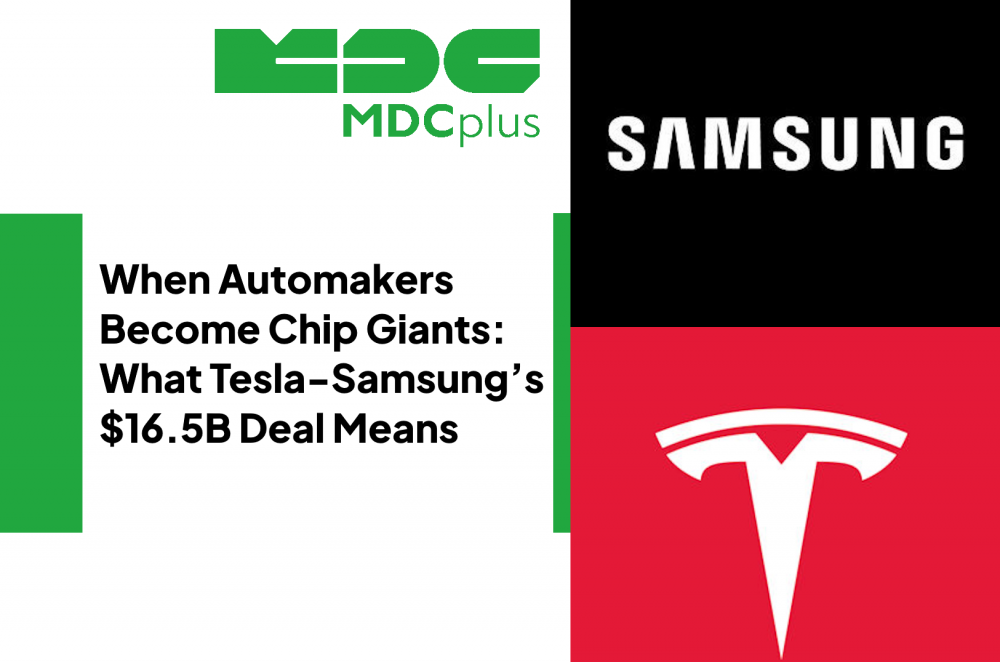When Automakers Become Chip Giants: What Tesla x Samsung’s $16.5B Deal Means
These chips will be manufactured at Samsung’s new Texas fabrication plant in Taylor, offering a potentially transformative lifeline for Samsung’s struggling foundry business. Samsung’s shares surged nearly 6.8 percent upon the news.
Positive Ripples in Tech and Auto Manufacturing
1. Rebooting Samsung’s Foundry Ambitions
Samsung’s contract manufacturing division has suffered mounting losses—estimated over ₩5 trillion in the first half of the year. By winning a long-term contract with a major automaker, Samsung injects high-profile demand into previously underused capacity, particularly its delayed Texas plant.
2. Automakers Stepping into Chip Supply Chain Roles
This deal signals a pivotal shift: automakers aren’t just buyers—they’re becoming strategic chip customers. As vehicles incorporate more AI, compute, and autonomy, carmakers like Tesla represent the fastest-growing demand segment for custom semiconductor design and production.
3. Nearshoring and Industrial Policy Alignment
With U.S.–South Korea trade talks looming and potential tariffs at stake, the deal strengthens bilateral tech ties. Producing chips domestically in Texas aligns with CHIPS Act goals and helps shield critical supply chains from geopolitical risk.
A Strategic Insight: Manufacturing as Ecosystem Reinvention
Beyond countable gains, the real trend here is strategic ecosystem building:
-
Automotive OEMs strategically reshaping chip markets
Instead of relying on third-party contract manufacturers, automakers are initiating multi-year chip contracts backed by in-house design and direct supply commitments. -
Revitalizing underperforming fabrication hubs
Samsung’s Texas fab—initially idle due to lack of clients—is now powered by automaker demand. This may serve as a model for rejuvenating other underutilized tech clusters. -
Specialization and co-innovation
Producing AI-focused chips like Tesla’s AI6 links vehicle R&D directly to chip manufacturing. This could accelerate integration between automotive engineering and semiconductor innovation.
Essentially, auto firms are becoming vertical integrators—now competing not only on vehicle design but on AI compute infrastructure.
Risks and Forward Views
-
Delivery and ramp risks
Tesla has a history of delays in both production and technology timelines. Analysts project actual output might stretch into 2027–2028 for AI6 production to become fully operational. -
Technology scope
The order is unlikely to include Samsung’s most advanced 2-nanometer nodes, which have yield challenges. It may focus on slightly older—but more reliably manufactured—processes. -
Growing competitive pressure
Samsung remains a minor player in logic-foundry market (under 10% share), trailing industry leaders like TSMC. A single large contract doesn’t erase broader competitive deficiencies.
Broader View
This multi-year automaker-foundry agreement highlights more than a single transactional win. It marks the emergence of automakers as long-term strategic buyers of AI chips, a move that could reshape the semiconductor demand structure. It also signals industrial shifts toward domestic, vertically integrated ecosystems pairing vehicle OEMs, chip fabs, and clean energy strategies.
For Samsung, it’s a chance at redemption in the contract logic space. For automakers, it represents ownership of critical compute architecture. For industry watchers, it signals a novel alignment of automotive and chip-making strategy.
About MDCplus
Our key features are real-time machine monitoring for swift issue resolution, power consumption tracking to promote sustainability, computerized maintenance management to reduce downtime, and vibration diagnostics for predictive maintenance. MDCplus's solutions are tailored for diverse industries, including aerospace, automotive, precision machining, and heavy industry. By delivering actionable insights and fostering seamless integration, we empower manufacturers to boost Overall Equipment Effectiveness (OEE), reduce operational costs, and achieve sustainable growth along with future planning.
Ready to increase your OEE, get clearer vision of your shop floor, and predict sustainably?
Other articles
While both involve structured review and analysis, their objectives, scope, and outcomes differ significantly. This article exploring this topic further.
